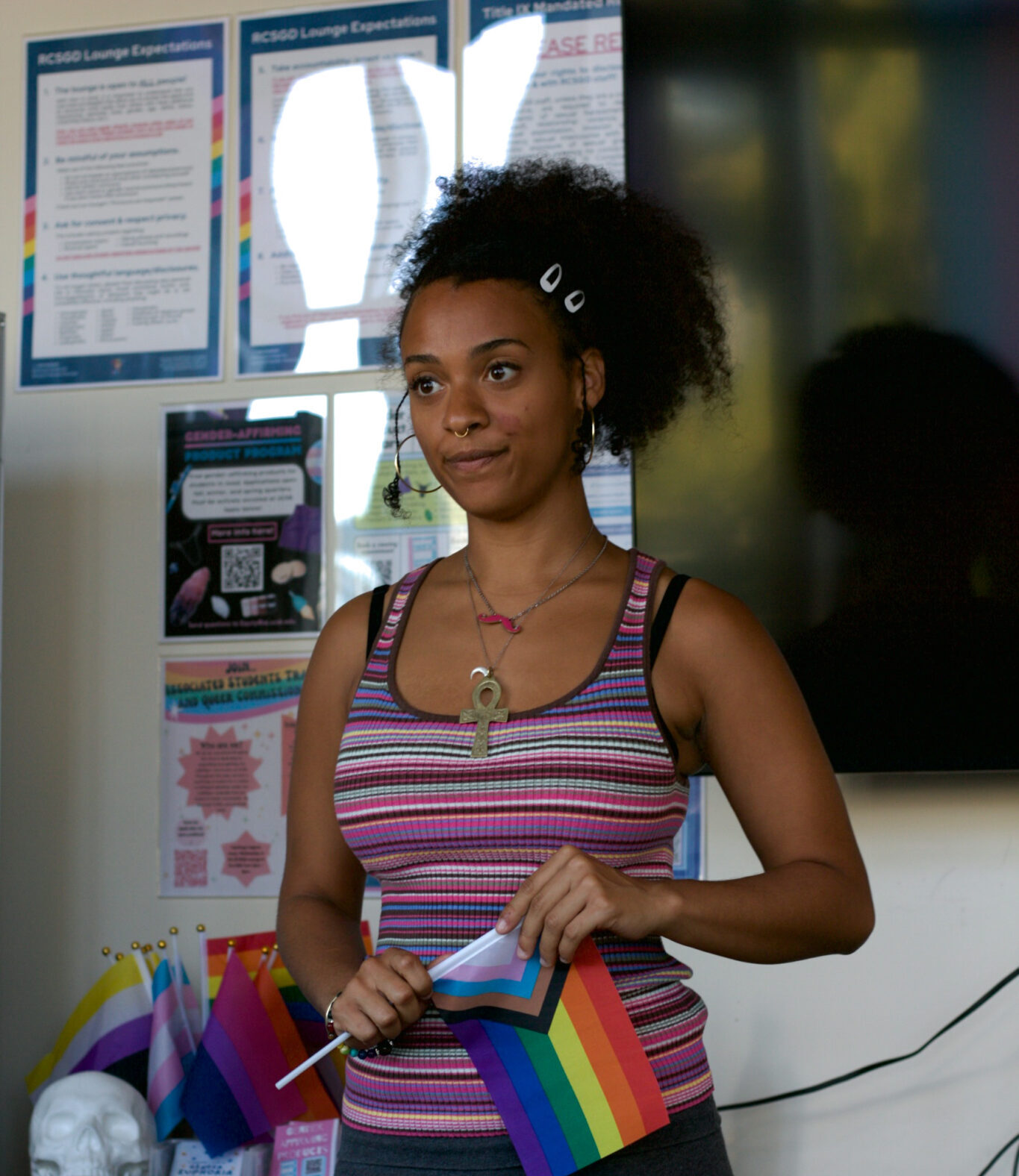Black Quare, a student organization that provides a third space for Black students who identify with the LGBTQIA+ community, held its first meeting on Oct. 17 after being inactive for about eight years.

Black Quare leadership delivered a presentation on the purpose of the club and also listened to attendee input for future events. Jaidy Pearson / Daily Nexus
The meeting, which focused on planning the club’s future, was held at the Resource Center for Sexual & Gender Diversity (RCSGD) Lounge in the Student Resource Building (SRB) and was attended by 10 students.
The meeting was led by club leadership — third-year Black studies and feminist studies double major Kharys Ebert, third-year philosophy and Black studies double major Leah Jackson and fourth-year Black studies and art double major Açucar Pinto.
Club leadership delivered a presentation on the purpose and vision for the club. Jackson began by discussing the origin of the term “quare,” coined by American scholar E. Patrick Johnson, whose writing has focused on how queer Black individuals have been denied their Blackness because of their queer identity.
“[Johnson] came to understand the need for a coalition between the belief of Black authenticity, rooting black queer exclusion and a desire for black respectability within the American imaginary,” Jackson said. “With concepts like theories of flesh and radical Black subjectivity, there’s an ability for queers to reclaim their identity as Black and carry change through positive relationships with communal differences.”
Jackson also read aloud one of Johnson’s quotes from his article entitled “Quare,” which read, “Some queer activists groups, however, have argued fervently for the disavowal of any alliance with heterosexuals, a disavowal that those of us who belong to communities of color cannot necessarily afford to make.”
She explained that this quote highlights how some Black LGBTQIA+ individuals have been historically excluded within their own communities, which they cannot afford, given their historical reliance on those same communities to survive.
Following this, Pinto explained the purpose of the club: to serve as a “specific third space for Black queer people.” Pinto emphasized that the club could help members build a community and find kinship with individuals they identify with.
“Queerness is not a one-time journey,” Pinto said. “We are constantly evolving, better understanding ourselves, so having conversations with others that really make us feel seen in a specific way.”
Additionally, Pinto said that the club could be a resource for members to access gender-affirming care and other resources, including housing, which they aim to achieve by advocating for more specified questionnaires for campus residence halls that would be more specific and used to foster a community for Black queer students.
Following this introductory presentation, attendees were encouraged to share their experiences of being Black and queer on campus. Some attendees stated that they had never found a community that was specifically for them.
“With the Black Resource Center, it feels so separate from queerness. When I come in here, I feel like I can connect more with people who are queer,” an attendee who was a third-year sociology major said. “There’s just this separation of Black and queer, and there’s not a lot of Black queer folk at this school, and that’s kind of upsetting for me.”
Others stated that they felt like there was a “fetishistic nature” to being a Black queer person in mainstream queer spaces.
“I was going to queer spaces, and I’m like, why does everyone have the craziest blaccent of all time, like ‘Yes mama, slay the boots house down,’ and I’m like, you don’t even know how to use the word,” Pinto said. “It’s so incredibly infuriating because you don’t want to police the community, but also, why are you using me as a beacon of culture?”
The meeting concluded with another group discussion that focused on what members wanted to do at future club events, which included events like a zine workshop and sip and paint.
Ashlee Priestley, an Office of Black Student Development (OBSD) counselor, helped revitalize the club alongside Marco Muñoz, the Assistant Director for Programs & Leadership of the RCSGD, and Tara Jones, a counselor from the Educational Opportunity Program.
Priestley said that Black Quare has existed on UCSB’s campus for around 20 years but has been inactive since either 2016 or 2017. Priestley said that she learned about the club when she was a student at UCSB and decided to help connect student leaders to revitalize it when she learned that it was something students were interested in after doing outreach at other events.
Ebert, Jackson and Pinto said that they began brainstorming ways to restart the club last spring and worked together throughout the summer to draft a club constitution as well as plan out club operations and activities.
Ebert said she hopes that Black Quare can continue to grow into a lasting community for Black queer students at UCSB.
“My vision is to build a beautiful Black queer community and let the world know that we are Black, we are queer and we are here,” Ebert said.
A version of this article appeared on p. 6 of the Oct. 23 print edition of the Daily Nexus.





















How do you think the club’s activities maintain its Black queer specificity while expanding its inclusion into the broader LGBTQIA+ community without losing its identity? Among Us Online
Hey ho